Filter by

Integrating Local Farmers Knowledge Systems in Rainfall Prediction and Availa…
- Edition
- -
- ISBN/ISSN
- 978-1-83962-629-6
- Collation
- -
- Series Title
- -
- Call Number
- -
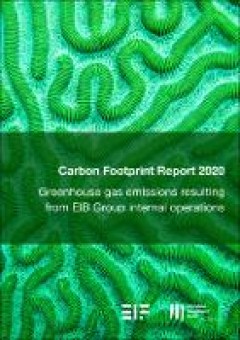
Carbon Footprint Report 2020: Greenhouse gas emissions resulting from EIB Gro…
This report provides a comprehensive breakdown of EIB Group greenhouse gas emissions arising from internal operations at head office locations in 2020. It also analyses comparatively against performance in previous years dating back to the 2007 baseline. As a result of the teleworking arrangements during the COVID-19 pandemic, the EIB Group’s net emissions in 2020 were more than 70% below 201…
- Edition
- Ed. 1
- ISBN/ISSN
- 9789286149290, 9789286149290
- Collation
- -
- Series Title
- -
- Call Number
- 551.6 EUR c
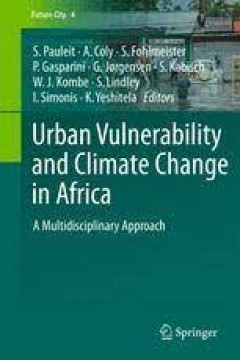
Urban Vulnerability and Climate Change in Africa A Multidisciplinary Approach
Urbanisation and climate change are among the major challenges for sustainable development in Africa. The overall aim of this book is to present innovative approaches to vulnerability analysis and for enhancing the resilience of African cities against climate change-induced risks. Locally adapted IPCC climate change scenarios, which also consider possible changes in urban population, have been …
- Edition
- -
- ISBN/ISSN
- 978-3-319-03982-4
- Collation
- -
- Series Title
- -
- Call Number
- -
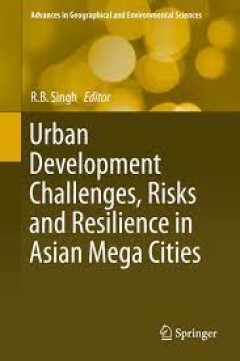
Urban Development Challenges, Risks and Resilience in Asian Mega Cities
In this book, an interdisciplinary research group of faculty members, researchers, professionals, and planners contributed to an understanding of the dynamics and dimensions of emerging challenges and risks in megacities in the rapidly changing urban environments in Asia and examined emerging resilience themes from the point of view of sustainability and public policy. The world’s urban popul…
- Edition
- -
- ISBN/ISSN
- 978-4-431-55043-3
- Collation
- -
- Series Title
- -
- Call Number
- -

Genomic Designing of Climate-Smart Vegetable Crops
- Edition
- 1
- ISBN/ISSN
- 978-3-319-97415-6
- Collation
- Kedokteran/ Obat
- Series Title
- -
- Call Number
- 615
- Edition
- 1
- ISBN/ISSN
- 978-3-319-97415-6
- Collation
- Kedokteran/ Obat
- Series Title
- -
- Call Number
- 615
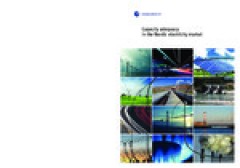
Capacity adequacy in the Nordic electricity market
An increasing share of intermittent renewable generation and reduced profitability of conventional power generation has led to a growing concern for capacity adequacy in the Nordic electricity market (Nord Pool market area). It does not make sense to assess capacity adequacy for each country separately in the Nord Pool market area as it is highly integrated in terms of both interconnector capac…
- Edition
- Ed. 1
- ISBN/ISSN
- 9789289342858
- Collation
- 143
- Series Title
- TemaNord,
- Call Number
- 551.68 NOR c

Oceanography and Marine Biology An Annual Review, Volume 60
Oceanography and Marine Biology: An Annual Review remains one of the most cited sources in marine science and oceanography. The ever-increasing interest in work in oceanography and marine biology and its relevance to global environmental issues, especially global climate change and its impacts, creates a demand for authoritative refereed reviews summarizing and synthesizing the results of both …
- Edition
- -
- ISBN/ISSN
- 9781003288602
- Collation
- -
- Series Title
- -
- Call Number
- -
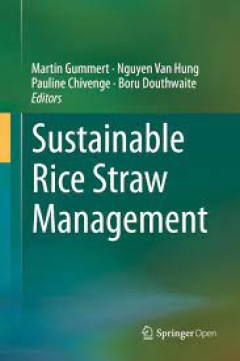
Sustainable Rice Straw Management
This open access book on straw management aims to provide a wide array of options for rice straw management that are potentially more sustainable, environmental, and profitable compared to current practice. The book is authored by expert researchers, engineers and innovators working on a range of straw management options with case studies from Vietnam, the Philippines and Cambodia. The book is …
- Edition
- -
- ISBN/ISSN
- 2020
- Collation
- -
- Series Title
- -
- Call Number
- -

Great Plains Regional Technical Input Report
Prepared for the 2013 National Climate Assessment and a landmark study in terms of its breadth and depth of coverage, Great Plains Technical Input Report is the result of a collaboration among numerous local, state, federal, and nongovernmental agencies to develop a comprehensive, state of the art look at the effects of climate change on the eight states that encompass the Great Plains region.
- Edition
- -
- ISBN/ISSN
- 978-1-59726-429-7
- Collation
- XX, 196
- Series Title
- -
- Call Number
- 658 STE g

Great Plains Regional Technical Input Report
Prepared for the 2013 National Climate Assessment and a landmark study in terms of its breadth and depth of coverage, Great Plains Technical Input Report is the result of a collaboration among numerous local, state, federal, and nongovernmental agencies to develop a comprehensive, state of the art look at the effects of climate change on the eight states that encompass the Great Plains region.
- Edition
- -
- ISBN/ISSN
- 978-1-59726-429-7
- Collation
- XX, 196
- Series Title
- -
- Call Number
- 658 STE g
 Computer Science, Information & General Works
Computer Science, Information & General Works  Philosophy & Psychology
Philosophy & Psychology  Religion
Religion  Social Sciences
Social Sciences  Language
Language  Pure Science
Pure Science  Applied Sciences
Applied Sciences  Art & Recreation
Art & Recreation  Literature
Literature  History & Geography
History & Geography